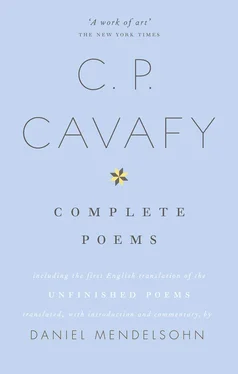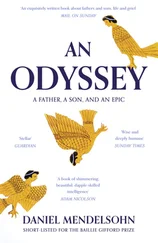For some time, the life he lived there was, as he later described it to his friend Timos Malanos, a “double life.” The poet had probably had his first homosexual affair around the age of twenty, with a cousin, during his family’s stay in Constantinople; there is no question that he continued to act on the desires that were awakened at that time once he returned to Alexandria. By day, when he was in his middle and late twenties, he was his corpulent mother’s dutiful son (he called her, in English, “the Fat One”), working gratis as a clerk at the Irrigation Office of the Ministry of Public Works in the hopes of obtaining a salaried position there. (This he eventually did, in 1892, remaining at the office with the famously Dantesque name—the “Third Circle of Irrigation”—until his retirement, thirty years later.) From seven-thirty to ten in the evening he was expected to dine with the exigent and neurotic Haricleia. Afterward, he would escape to the city’s louche quarters. One friend recalled that he kept a room in a brothel on the Rue Mosquée Attarine; another, that he would return from his exploits and write, in large letters on a piece of paper, “I swear I won’t do it again.” Like many bourgeois homosexual men of his era and culture (and indeed later ones) he seems to have enjoyed the favors, and company, of lower-class youths: another acquaintance would recall Cavafy telling him that he’d once worked briefly as a dishwasher in a restaurant in order to save the job of one such friend, who’d been taken ill. About the youths and men he slept with we know little. We do know, from an extraordinary series of secret notes that he kept about his habitual masturbation, that the amusing Alexandrian nickname for that activity—“39,” because it was thought to be thirty-nine times more exhausting than any other sexual activity—was not entirely unjustified:
And yet I see clearly the harm and confusion that my actions produce upon my organism. I must, inflexibly, impose a limit on myself till 1 April, otherwise I shan’t be able to travel. I shall fall ill and how am I to cross the sea, and if I’m ill!, how am I to enjoy my journey? Last January I managed to control myself. My health got right at once, I had no more throbbing. 6 March 1897.
At about the same time he’d settled in his rather dreary job, he began to write and publish seriously. (He had been writing verse, in English and French as well as in Greek, since at least the age of fourteen; and the family’s flight to Constantinople in 1882 inspired a journal that the nineteen-year-old Cavafy, already in love with literature, called Constantinopoliad: An Epic, which he soon abandoned.) Apart from that, the life he led, as he got older, wasn’t noticeably different from that of many a midlevel provincial functionary. He enjoyed gambling, in moderation; he played the stock market, not without success. Apart from his constant and extensive reading of ancient and modern historians in a variety of languages, his tastes in literature were hardly remarkable. His library of about three hundred volumes contained a quantity of what his younger Alexandrian friend, the botanist J. A. Sareyannis, later recalled, with a palpable shudder, as “unmentionable novels by unknown and forgotten writers.” An exception was Proust, the second volume of whose Le Côté de Guermantes he borrowed from a friend not long after its publication. “The grandmother’s death!” he exclaimed to Sareyannis. “What a masterpiece! Proust is a great writer! A very great writer!” (Interestingly, he was less enthusiastic about the opening of Sodome et Gomorrhe, which he dismissed as “pre-war.”) He particularly enjoyed detective novels. Simenon was a favorite in his last years.
At the turn of the century, when he was in his early forties, he took a few trips to Athens, a city that was largely indifferent to him—as he, an Alexandrian, a devotee of the Hellenistic, the Late Antique peripheries, had always been indifferent to it, the great symbol of High Classicism. He likely fell in love there with a young littérateur called Alexander Mavroudis; but about this, like so much of his erotic life, we will never have more than the odd hint. A few years later—by now his mother had been dead for almost a decade—he came to live at the overstuffed apartment on Rue Lepsius (today the Cavafy Museum), where he would spend the rest of his life. For Sareyannis, who wrote a reminiscence of his friend for an Athens journal in 1944, it is only too clear that the poet’s taste in decor was clearly no better than his taste in fiction:
Cavafy’s flat was on an upper floor of a rather lower-class, unkempt apartment house. Upon entering, one saw a wide hall laden with furniture. No walls were to be seen anywhere, as they were covered with paintings and, most of all, with shelves or Arabian étagères holding countless vases—small ones, large ones, even enormous ones. Various doors were strung along that hall; the last one opened onto the salon where the poet received his visitors. At one time I greatly admired that salon, but one morning in 1929, as I was passing by to pick up some collections of Cavafy’s poetry to be delivered to friends of his in Paris, I waited alone there for quite a while and was able to study it detachedly. With surprise I realized for the first time that it was crowded with the most incongruous things: faded velvet armchairs, old Bokhara and Indian stuffs at the windows and on the sofa, a black desk with gilt ornament, folding chairs like those found in colonial bungalows, shelves on the walls and tables with countless little columns and mother-of-pearl, a koré from Tanagra, tasteless turn-of-the-century vases, every kind of Oriental rug, Chinese vases, paintings, and so on and so on. I could single out nothing as exceptional and really beautiful; the way everything was amassed reminded me of a secondhand furniture store. Could that hodgepodge have been in the taste of the times? I had read similar descriptions of the homes of Anatole France and of Villiers de l’Isle Adam, who were also, both of them, lovers of beauty and gave careful attention to their writing. Whether Cavafy himself chose and collected those assorted objects or whether he inherited them, I do not know; what is certain is that Cavafy’s hand, his design, could not be felt in any of that. I imagine that he just came slowly to love them, with time, as they were gradually covered with dust and memories, as they became no longer just objects, but ambiance. (tr. Diana Haas)
The cluttered, déclassé surroundings, the absence of aesthetic distinction, the startlingly conventional, to say nothing of middlebrow, taste: Cavafy’s apartment, like his job, gave little outward sign of the presence of a great artistic mind—the place from which the poetry really came. The more you know about the life, the more Seferis’s pronouncement that Cavafy existed only in his poetry seems just.
Most evenings, as he grew older, found him at home, either alone with a book or surrounded by a crowd of people that was, in every way, Alexandrian: a mixture of Greeks, Jews, Syrians, visiting Belgians; established writers such as the novelist and children’s book author Penelope Delta, Nikos Kazantzakis, a critic or two, younger friends and aspiring writers. (Among the latter, eventually, was Alexander Sengopoulos, known as Aleko, who was very possibly the illegitimate son of one of Cavafy’s brothers—acquaintances remarked on a striking family resemblance—and would eventually be his heir.) To these friends and admirers the poet liked to hold forth, in a voice of unusual charm and authority and in the mesmerizing if idiosyncratic manner memorably described by E. M. Forster, who met Cavafy during World War I, when Forster was working for the Red Cross in Alexandria. It was Forster who would do more than anyone to bring Cavafy to the attention of the English-speaking world, and it is to him that we owe the by-now canonical description of the poet as “a Greek gentleman in a straw hat, standing absolutely motionless at a slight angle to the universe.” Cavafy, the novelist recalled,
Читать дальше












